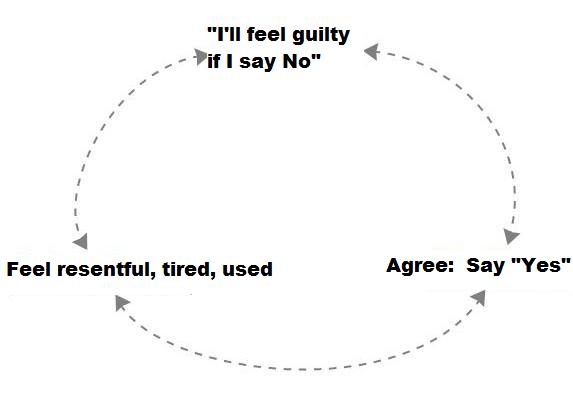Interpersonal Effectiveness - part 4
It can very often be difficult to say no to people who make demands of us, and if we say no, we can get caught up in self-critical thoughts leading us to feel guilty. To avoid feeling guilty, we just keep on saying “yes” to every request.
Someone asks us to do something:

We can learn ways of saying “No” that don’t lead us to think self-critically or feel guilty. For example:
- I’m sorry but I really can’t take on anything else at the moment.
- I’m quite busy right now. Perhaps another time.
- I’d like to help you out, but I just don’t feel up to it at the moment.
- Thank you for asking me. You’re a nice person, but I don’t want to go out with you.
- I don’t need a new roof (double glazing, vacuum cleaner etc). I’m happy with what I have thank you.

If the person seems to have trouble accepting your “No”, then just keep repeating yourself, over and over if necessary. You might have to add the word “No” to the beginning of those statements, perhaps with some emphasis on that word. For example:
No. I’m sorry but I really can’t at the moment.
Be wary of those self-critical thoughts afterwards. Practice challenging and/or dismissing them, by telling yourself:
- I explained to them why I couldn’t do it
- It’s not my responsibility
- It would only end up upsetting me if I agreed to it – this is best for me. If I feel less tired and not resentful, then I might be a better position to help them out next time
- They’re just thoughts – I don’t need to pay them any attention (then put your focus of attention on something else)
Telling others what we want
When we want something, we use all sorts of messages to try to let others know, such as hints, expressions and gestures, hidden meanings in what we say.
But the only way to ensure that someone has really understood what you want, is to be clear in what you say:
- I’d like you to give me a hug
- I want to be your friend, but not your girlfriend
- I want to talk to someone…
- I’d like to leave now
It may not always be possible to get what we want or feel we need, perhaps because that would impact on other people. Having said what you’d like, then we need to consider the response according to the rights of the other person too. It’s often possible to compromise, which can respect the rights of all those involved:
- Assertiveness PDF (Interpersonal Effectiveness)
- DBT Dialectical Behaviour Therapy
- MP3 guided imagery and relaxation downloads
- The Decider - a pictorial prompt sheet and manual to help us choose the best coping skill
- Relaxation
- Self-Help Course Step 1
- Mindful Breathing
- Colour Breathing
- Anxiety self-help
- Depression self-help
- Anger self-help
- Multimodal Self-Help & Treatment Plan
- STOPP
- Defusing Exercises
- Different Perspectives
- The Helicopter View
- Imagery Self-Help
- NOW
- Meditation
- Accept, Change or Let go?
- ACE Activity
- Distress Tolerance
- Emotion Regulation
- Interpersonal Effectiveness
See also: The Decider Skills for Self Help online course
More information:
Self Help Books
How to be Assertive In Any Situation
When I Say No, I Feel Guilty: How to Cope, Using the Skills of Systematic Assertive Therapy
Brilliant Assertiveness: What the Most Assertive People Know, Do and Say (Brilliant Lifeskills)
Assertiveness: How to Stand Up for Yourself and Still Win the Respect of Others
























